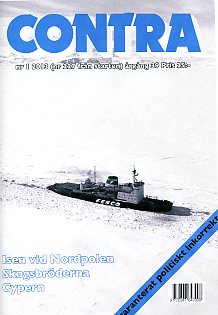
Decreased taxation pressure on Swedes
by C G Holm
In spite of the government budget surplus Swedish Chancellor of the Exchequer (Secretary of the Treasury) Anders Borg wants to keep the 5 per cent surplus tax on income exceeding 100 000 dollars a year. A tax giving a total of 0.3 per cent of tax income! But in spite of the reluctance to cut back on marginal tax rates, the present centre-right government has achieved a signifcant decrease in total taxation. Sweden does not have the highest taxes in the world any more. Denmark is worse, and with the new French president France will soon follow Denmark suit. During the past seven years of centre-right government the general income tax has been cut back, special deductions for services bought fromm professionals offering services with a high percentage of payroll taxes (plumbers, carpenters, daycare personnel and so forth) have been introduced. VAT in restaurants has been cut by half, as has the payroll tax for young people. The property tax has been cut even more and the wealth tax has been abolished. Already the former centre-left government abolished the inheritance tax.
The true plans of Russia in Cyprus
by Bertil Wedin
Russia has increased its influence in Southern Cyprus. Which is seen in connection with the present Cypriot banking crisis. Forty per cent of deposits in Cypriot banks are from Russia. Middle class Russians are attracted by the mild climate, but also the Russian mafia has seen Cyprus as a good haven for their money. Until now.
The fiscal cliff – and the real problems of the United States
by Allan C. Brownfeld
At the edge of the fiscal cliff the House of Representatives voted 257–167 against a bill already approved by the Senate, a bill that would have avoided drastic tax increases and expense cutbacks. After the vote stock prices soared. No one bothered that neither Republicans nor Democrats made any efforts to take care of the real financial problems of the country. The Congress kicked the can forward along the road…
Forest brothers – partisan war in Lithuania 1944–1953
by David Stavenheim
In our neigbouring countries on the other side of the Baltic, partisans fought against the communist occupying forces well into the 1950s. Partly with the support of Sweden and NATO. Unfortunately the Soviet agent Kim Philby gave the Soviets names and landing places of partisans returning from the West, and many were captured and forced to work for the Soviets (or they were killed). Lithuanian Juozas Luksa made it when he parachuted into Lithuania in 1950, but he was killed by the Soviets when he was to see new rebels that arrived in 1951. Fighting continued for decades and the last partisan killed in action was Pranas Koncius who died in 1965. The very last partisan in Lithuania, Stasys Guiga, succeeded in keeping himself hidden until 1986, only five years before Lithuanian independence.
The government usurpation of the civil society
by Fredrik Runebert
The ”civil society” (NGOs and private citizens) are somewhat left behind in Swedish political discussion. The ”civil society” is the part of society not run by the government, nor by markets. In the government sector the foundation is equality before the law. In the market sector the basis is purchasing power, preferences and businessmanship in the form of millions of free agreements. The government sees the citizen as a client and the businessman sees him as customer. But man is more than a client and a customer, he is a social being. Enjoying friendship and mutuality. This is where the ”civil society” has its role. Where you find true mutuality.
The Arctic icecap and the ”global warming”
The past summer (yes in September, when the ice cap is at its minimum) war size headlines were used when the Arctic icecap was the smallest since the measuring started. It had been quiet in the media since 2007, as the icecap had been larger all the years in between. But during the summer 2012 heavy storms broke up parts of the icecap immediately before the winter. In October no one wrote about the icecap as it was larger again. And in the early spring of 2013 the icecap has normal levels again.
Operation Northern Lights
by C G Holm
In the Stasi Archives in Berlin there is a book in Swedish called ”Operation Northern Lights”. The book was based on research in the Archives for years. In the Stasi Archives, in the Archives of Nazi Germany (those parts that were kept in East Germany) and in American Archives. The objective was to get a Swedish author to publish the book before the International Conference on Cooperation and Security (the Helsinki Conference) met in 1973–1975. The idea was to discredit Sweden for collalborating with nazi Germany during the war (it was tricky even for Stasi to exclude East germans from the records). The project especially hit at Prime Minister Olof Palme, whom the East Germans had concluded was an anti-Communist. Soon before the conference the Communists found that Palme had accepted their view hook, line and sinker, and the book was left where it was, in the Stasi Archives. Swedish author Christoph Andersson has read the book.

